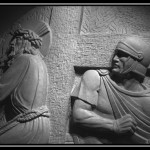We run our website the way we wished the whole internet worked: we provide high quality original content with no ads. We are funded solely by your direct support. Please consider supporting this project.

The Worst Heresy That Never Got Anyone Burned at the Stake
According to John’s Gospel, on the evening of his crucifixion Jesus clearly articulated the single-most important quality by which his followers would be recognized: “By this all men will know that you are my disciples, if you love (agape) one another” (John 13:35). Or again: “But I tell you, love your enemies and pray for those who persecute you, that you may be children of your Father in heaven” (Matt 5:44). As the apostle Paul reminds us, even the best deeds and most impressive religious phenomenon and achievements are simply worthless religious noise (“clanging cymbals”) unless they are motivated by and express Jesus-looking love (1 Cor 13).
In this light, what are we to think of Christians when, in “the name of Christ” and for “the glory of God,” they engage in any type of violence? In days past, the Church that tortured and murdered its enemies was certainly “orthodox” in its core beliefs. It believed in the Trinity, the Incarnation, the atonement, the need for grace, the inspiration of the Bible and many other true things.
Yet—call me crazy if you will—it seems to me that the barbaric activity that the Church endorsed and practiced “in the name of Jesus” wasn’t expressing Christ-like agape love. And since the NT teaches that anything that doesn’t express Christ-like love is devoid of Kingdom value, however true and impressive it might otherwise be, we can only conclude that the Church that engaged in this anti-Christ activity was not the Kingdom. Without love, believing all the true beliefs in the world is worthless. James makes this very point by reminding us: “You believe that there is one God. Good! Even the demons believe that—and shudder” (Jas 2:19).
The Kingdom always reflects the character of the one who incarnated it and first established it. Jesus never tortured or murdered his enemies. He gave his life for them. So any religion that advocates torturing or killing enemies rather than sacrificing your life for them is not the Kingdom, regardless of how many true beliefs it contains. When it comes to the centrality of agape-love it really is just that simple—as the NT consistently teaches us.
I know that in arguing this way I’m coming up against a long and cherished tradition that has identified the Kingdom of God with doctrinal orthodoxy. So let me come at this from another angle.
It seems we should regard the command to love as the ultimate test of orthodoxy. “Orthoprayxy” (correct practice/lifestyle) is the necessary condition for an “orthodoxy” (correct belief) that is glorifying God. In this light, I don’t see how we can avoid concluding that those who burned heretics alive for the glory of God were far worse heretics than those they set on fire.
For example, in the 16th century John Calvin had the heretic Michael Servetus burned at the stake for denying that Jesus was the eternal Son of God and for rejecting infant baptism. Servetus’s denial of Jesus’s deity was unorthodox, for sure. But in the light of the all-or-nothing emphasis of the NT on manifesting Christ-like love, how can we avoid concluding that Calvin was a far worse heretic for having him burned alive? He certainly was not self-sacrificially loving, doing good to, and blessing his enemy as Jesus commanded.
In fact, while Church history is full of people being tortured or put to death for heresies such as not acknowledging the authority of the Church, baptizing wrongly, and denying the Trinity, how is it that there’s no record of anyone so much as having their hand slapped for not loving enough (let alone for torturing and killing people)? And how is it that neither God’s love nor the command to live in love is so much as mentioned in any of the major ecumenical creeds of the Church?
Now, I’m not suggesting that we are in a position to pass individual judgment on Calvin or anyone else. Each of us must consider ourselves the worst of sinners. Each of us has a log in our own eye, as Jesus said. Were we in Calvin’s shoes, we might very well have done the exact same thing. As mere humans who know very little, and as sinners who have planks sticking out of our eyes, we must leave all judgment up to the One who alone knows the innermost hearts of people.
But this doesn’t mean we can’t discern what is and is not of the Kingdom. We can’t ever separate ourselves from others and place ourselves above others. But we can and must separate things. And so we must clearly and emphatically separate torturing and killing people in Jesus name (or for any other reason) from the beautiful, Jesus-looking Kingdom.
_______
art: “Fire, Full Moon”
by: Paul Klee
date: 1933
Category: General
Tags: Calvinism, Enemy Love, Heresy, Love Your Enemies, Self-Sacrificial Love, Torture
Topics: Following Jesus
Related Reading

Why NO Violence in Jesus’ Name is Justified
Image by papapico via Flickr On Friday, Greg posted a response to Obama’s speech about religiously-inspired violence. Here are some further thoughts on why violence in the name of Jesus—no matter whether we call it just, redemptive, or defending ourselves—is just another form of kingdom-of-this-world living. The love we are called to trust and emulate is supremely…

Can Self-Sacrificial Love Be Dysfunctional? (podcast)
Self-sacrificial love goes under the microscope as Greg and Dan push and shove to get the last word. Episode 506 http://traffic.libsyn.com/askgregboyd/Episode_0506.mp3

Voluntary Suffering and the Kingdom
In a post from two days ago, I wrote about the call to voluntary suffering for others as it is laid out in the New Testament. For the first three centuries of the church, Christians understood this call as they sought to follow Jesus’ example of forgoing the use of violence and expressing God’s self-sacrificial…

Predestination Part 2: Seeing Destiny Rightly
For Part 1, click here. In Ephesians Paul teaches that God “chose us in [Christ] before the creation of the world to be holy and blameless in his sight” (Eph 1:4). In Christ, Paul continues, God “predestined us for adoption to sonship…to the praise of his glorious grace, which he has freely given us in…

The Cruciform Center Part 2: How John’s Gospel Reveals a Cruciform God
In the previous post, we looked at how the Synoptics illustrate the centrality of the cross. While the Gospel of John varies in its structure and language from the Synoptics, the cross remains at the center. This centrality is expressed in a number of different ways. 1. The role that Jesus’ death plays in glorifying…

Willing to Bleed
What does salvation have to do with social justice? Greg turns this often-politicized question on its head in this video by The Work of the People.
